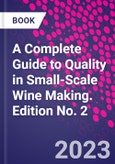A Complete Guide to Quality in Small-Scale Wine Making, Second Edition is the first and only book to focus specifically on the challenges relevant to non-industrial scale production of optimal wine with a scientifically rigorous approach. Fully revised and updated with new insights on the importance of all aspects of the production of consistent, quality wine, this book includes sections on organic wine production, coverage of the selection and culturing of yeast, and the production of sparkling, 'methode champenois' and fortified wines. The new edition includes insights into the latest developments in flavor chemistry, production protocols, NIR and FTIR for multipurpose analysis and microplate and PCR procedures, and IR methods for essential analysis among others.
Written by an expert team with real-world experience and with a multi-cultural approach, this text will provide a complete guide to all the stages of the winemaking process and evaluation, and clearly explains the chemistry that underpins it all.
Please Note: This is an On Demand product, delivery may take up to 11 working days after payment has been received.
Table of Contents
1. Introduction to the Wine Making Process2. The Human Interactions
3. Wine Composition and Chemistry
4. Quality Assurance, Systems and Safety, and their Cultural Drivers
5. Wine Production Processes
6. Wine Microbiology and Methods
7. Fruit Composition, Quality and Harvest Protocols
8. Winemaking Protocols
9. Analytical Principals
10. Experiments for the Winemaker
11. Key Analyses
12. Analyses for Quality Assurance, Teaching and Research








